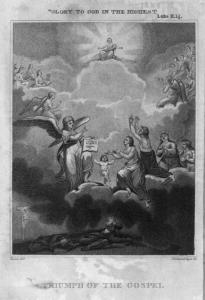 We find in this marvelous passage for today one of the clearest statements of the gospel of God as one can find in the Bible. Please note that I said the “gospel of God.” For too many Christians, they assume that unless the name of Jesus is announced there can finally be no gospel. I completely and thoroughly disagree! Unless we find the work of God in the Hebrew Bible, places where God with the name of YHWH acts in unbreakable love with and for the people, surely a fuller understanding of that gospel is not available to any follower of the one called Jesus. For that reason it is completely appropriate that this passage is chosen for the day now called the Baptism of the Lord.
We find in this marvelous passage for today one of the clearest statements of the gospel of God as one can find in the Bible. Please note that I said the “gospel of God.” For too many Christians, they assume that unless the name of Jesus is announced there can finally be no gospel. I completely and thoroughly disagree! Unless we find the work of God in the Hebrew Bible, places where God with the name of YHWH acts in unbreakable love with and for the people, surely a fuller understanding of that gospel is not available to any follower of the one called Jesus. For that reason it is completely appropriate that this passage is chosen for the day now called the Baptism of the Lord.
I suppose that the compilers of the lectionary were struck by the first verse of this passage that announces the “calling by name” of the redeemed ones of Israel. This of course echoes Jesus’ calling by name at his baptism, the famous “You are my son, the beloved” (Luke 3:22). But such a direct connection of the language of the two scenes should not obscure the far richer idea that the redemption of God is announced in both places, in short the gospel of God is made plain. The Isaianic context is crucial to make the point.
Is.42:21-25 paints a dark portrait of a disobedience of the people of God so appalling as to have led them into the horror of Babylonian exile. “Was it not YHWH against whom we have sinned, in whose ways they would not walk, and whose Torah they would not obey” (Is. 42:24)? It was therefore an exile they so richly deserved! But while they languished in their punishment from YHWH, that same YHWH spoke a completely different word to them. In a word, YHWH spoke to them the gospel of God.
“But now, thus says YHWH, who created you, O Jacob, who shaped you, O Israel. Do not fear, for I have redeemed you; I have called you by name; you are mine” (Is.43:1). Like a clap of thunder, this astonishing and wholly unexpected announcement bursts into the ears of the exiles like spring rain, like the rivers in the desert that YHWH will promise them as they prepare to return to their homeland. “When you pass through the waters, I will be with you; and through the rivers, they will not overwhelm you” (Is.43:2). Isaiah now rings the literary changes on the storied past of this people, beginning with the creation of the world out of the primeval waters of chaos in Genesis, to the victory over the unconquerable Egyptians at the Sea of Reeds, down to the crossing over the Jordan into the land of promise. Israel need never fear the terrifying waters, whether of sea or river, because YHWH is “your God, the Holy One of Israel, your Savior” (Is.43:3).
Nor should Israel fear any nation, since YHWH is with them. Egypt, Cush (Ethiopia or Nubia), nor Seba can overcome them, because “you are precious in my sight; you are honored; I love you” (Is.43:4). Not only will the Babylonian exiles return to the promised land, but YHWH will also cause “offspring of Israel” from east, west, north, and south to return as well, an inclusive multitude of the chosen of YHWH. “Bring my sons from far away and my daughters from the ends of the earth—everyone who is called by my name, whom I created for my glory, whom I shaped and made” (Is.43:5-7). The prophet here expands immeasurably the scope of the chosen people. Not only will the Babylonian exiles constitute the redeemed folk of YHWH who will return and repopulate the land, but there will also be unnumbered thousands from all corners of the known world, from the very ends of the earth, who will make up the newly re-formed Israel. In a blast of gospel power, Isaiah reshapes the hope and promise of the chosen people in their chosen land. Later in further challenging words of YHWH, the prophet will say, “It is too light a thing that you should be my servant to raise up the tribes of Jacob and to restore the remnant of Israel; I will give you as a light to the nations that my salvation may reach to the end of the earth” (Is.49:6). The gospel of God may not be confined to any one people, but must include “all who are called by my name.”
It is crucial that we get the order of these amazing words clearly in our mind. YHWH here, while Israel is languishing in their just punishment, announces God’s gift of freedom and redemption. Paul, the apostle of God, put this memorably: “While we were still sinners, Christ died for us; that proves God’s love for us.” Indeed! But Paul did not make that phrase up; he got it straight from his Judaism, rooted in the sacred text of the Hebrew Bible. While Israel was in exile, and while the whole world was straying far from the Torah of God, YHWH proclaimed freedom to the captives, sight to the blind, hearing to the deaf, hope for the hopeless, a future for those who thought their lives had ended. We find our hope not in our will to act as God would have us act, not in our decision to be the people God has created us to be. That thinking is plainly not the gospel, however often we preachers have implied or stated that it is. The gospel is only rooted in the unimaginable and unmerited love of God, and with the certainty of that love we can then become the true people of God.
Let me be blunt: any preacher who states that you “must take Jesus into your heart” is quite directly denying the heart of the gospel of God. According to Isaiah and according to the one whose baptism we celebrate this day, the love of God comes to us unbidden and unearned. Based on that freely offered love, we may begin our journey to wholeness and hope in God; the gospel is not at all first about us, about anything we do. It is about God; it is rooted in God; it is the gift of God. Any claim otherwise undercuts the very heart of God’s will for us. “We love, because Christ (in God) first loved us.” There, certainly, is the gospel on which we stand and by which we live.
(Images from Wikimedia Commons)















